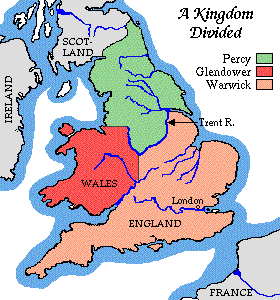Henry IV
Unlike his royal cousin Richard, Henry Bolingbroke was warlike: an exemplary jouster and a renowned crusader*.
Though Henry does not seem to have planned his usurpation*, it was an easy step to the throne, thanks to Richard's military ineptitude and great unpopularity.
Henry, in contrast, was popular both with the commons and the nobility*, and he gained much sympathy because his father's lands had been wrongfully taken from him. Once on the throne, Henry's reign was unstable, and was marked by continual rebellions. Those who welcomed him as a saviour changed their tune when again subjected to heavy taxation by the new regime.
Who was the legitimate heir?
There was good reason for argument over who was the legitimate heir of Edward III on Richard's death, since the principle of succession was not fully settled (though by the time Shakespeare was writing it was clearly the "heir general"). There were two arguments, and two heirs.
- Heir male: one whose lineage can be traced in the male line of descent from a king, the eldest line of descent given precedence (in this case the rightful heir was Henry Bolingbroke, son of John of Gaunt, fourth son of Edward III).
- Heir general: one whose lineage is traced through either male or female descendants of a king, the eldest line of descent given precedence (in this case Richard's heir was Edmund Mortimer, grandson of Philippa, daughter of Lionel of Clarence, third son of Edward III).
Edward III and Henry V each laid claim to the French throne as an heir general, tracing their descent through Edward's mother.
Footnotes
-
Henry the crusader
Henry had fought for the Christians in Lithuania, but as King he never achieved his ambition of leading a crusade to Jerusalem. The closest he got was when he died in the Jerusalem Chamber at Westminster Abbey.
-
Henry's ascent to the throne
Henry had initially only intended to regain the vast Lancastrian estates which King Richard wrongfully seized on the death of Henry's father, John of Gaunt. It was a major tactical error to threaten the property rights of nobles, as they perceived a common threat in such infringements--and as York points out in Henry IV, Part One, Richard was attacking the same principle of order that made him king by right of succession.
-
Noble allies
Many nobles flocked to join Henry when he landed at Ravenspur in Yorkshire, but the most powerful among them were his brother- in-law, the Earl of Westmorland, and Henry Percy, Earl of Northumberland. They even included Richard's uncle Edmund of Langley, Duke of York, who had been appointed regent during the King's absence in Ireland.
